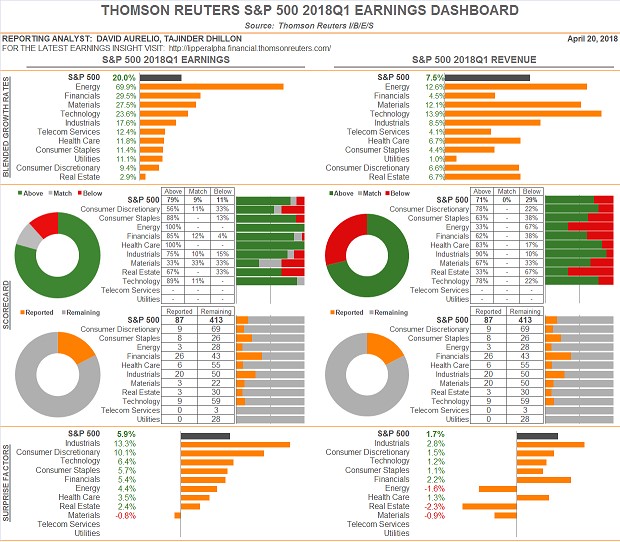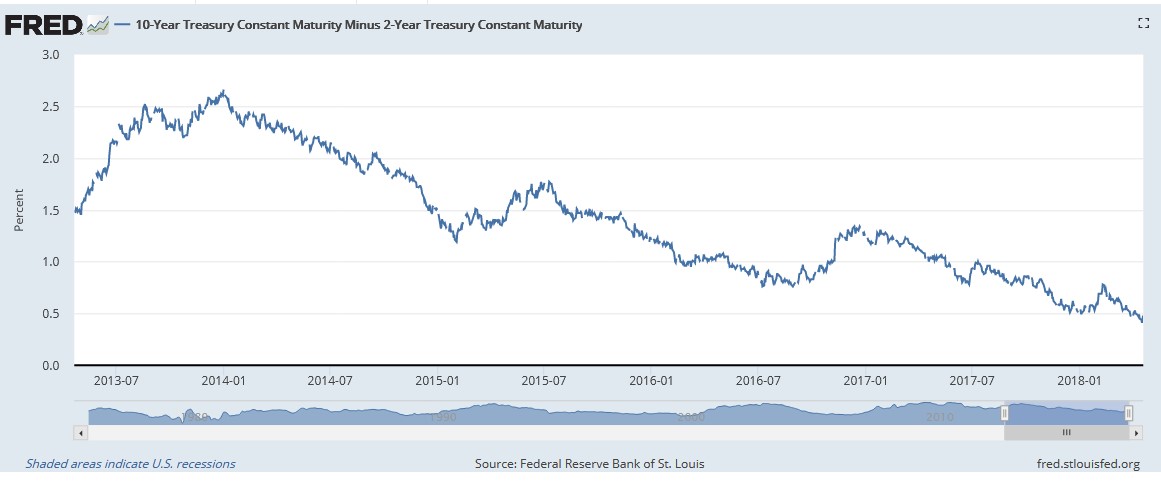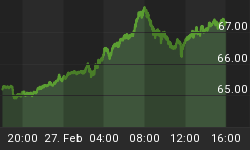First quarter 2018 earnings season is underway, and the bulls are once again ringing the register with nearly 80 percent of companies exceeding Wall Street expectations with reporting so far. The long-term average is only 64 percent, so there is reason to be optimistic about the Q1 numbers.
Despite the smashing, market-wide outperformance, the financial sector has still managed to grab the headlines with average earnings growth of 29.5 percent, second only to the energy sector's 69.9 percent.

(Click to enlarge)
The energy sector got the rub of the green from a nice rebound in oil prices. But its financial peer has president Trump's tax bonanza to thank for the feat.
The big banks have been reporting record profits, with five of six of the country's largest banks posting double-digit bottom line growth.
Here's a summary of their report cards:
• America's biggest bank, J.P. Morgan Chase, reported record profits of $8.7 billion, good for a solid 35-percent year-over-year growth clip.
• Bank of America reported a 30-percent earnings growth to a record quarterly profit of $6.9 billion.
• Morgan Stanley's net income of $2.7 billion represented a robust 42-percent increase compared to last year's corresponding quarter.
• Goldman Sachs reported $2.3 billion Q1 earnings, up 26 percent.
• Citigroup's earnings improved 13 percent to $4.6 billion, a 3-year high watermark for the company.
• Well Fargo was the laggard of the group, with preliminary net income of $5.9 billion being a 5.3-percent increase. The bank's final net profit is set to drop to just $4.7 billion after it agreed to pay CFPB/OCC a $1 billion fine as resolution for mortgage- and auto-loan unit issues.
Improving Economy
The strong earnings show comes as little surprise after the recently enacted tax law lowered the banks' tax rates from 28-31 percent to 17-23 percent. The Associated Press estimates that the cuts helped the banks save ~$3.6 billion in taxes during the first quarter, which translates to an impressive $14 billion in annual tax savings.
But tax savings is just one of the factors that have been contributing to the health of the sector.
Rising interest rates, though mild, have been gradually improving margins for banks. Throw in a growing economy and rising wages and banks are in the mood to loan money again leading to bigger profits. Related: Is Silver Poised For A Massive Break Out?
Roughly half of profits by banks comes from interest income with the rest deriving from fees from merchant payments, credit card processing, overdraft charges, insurance brokerage, annuities, mutual funds and a slew of other fees.
Banking Stocks Remain Muted
Stocks of companies that beat Wall Street earnings estimates tend to rise quite a bit after earnings calls—but that’s not happening. Indeed, it is perplexing that banking stocks and ETFs have mostly remained flat after earnings, with some even reversing course.
There are a few possible explanations behind this behavior. The financial sector put forth an exemplary performance in 2017 due in large part to expectations about tax reforms by Trump's administration. It's possible that the good news has already been fully priced into banking stocks.
Others include falling loan demand, rising credit card delinquency and a flattening yield curve, with the latter bearing the greatest weight.
The spread between the 2-and 10-year Treasury yields has fallen to just 45 basis points, an 11-year low. An inverted curve tends to follow when the spread falls below 50 basis points, which inevitably brings with it fears of a recession. That, coupled with a general stock market weakness, could have put paid the bulls' hopes for a fresh rally.

(Click to enlarge)
Source: Federal Reserve Bank of St. Louis
By Fred Dunkley for Safehaven.com
More Top Reads From Safehaven.com:
















